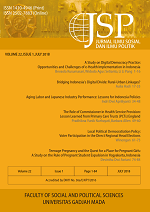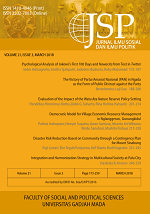Does the Covid-19 Pandemic Affect the Stock Market in Indonesia?
Dwi Rahmayani(1*), Shanty Oktavilia(2)
(1) Department of Development Economics, Faculty of Economics, Universitas Negeri Semarang
(2) Department of Development Economics, Faculty of Economics, Universitas Negeri Semarang
(*) Corresponding Author
Abstract
This study aimed to analyze the existence and effect of the Covid-19 pandemic on the stock market over the long-term and short-term in Indonesia. The study followed Krugman’s (1979) approach stating the pandemic crisis problems have the potential to decrease the performance of the international balance of payments which will ultimately lead to uncertainty in the market. The research method was the Error Correction Model (ECM) with stock markets as an endogenous variable; and exchange rate, inflation, interest rate, foreign stock markets, commodity price, and pandemic as exogenous variables. The pandemic indicator was measured by total accumulative cases of Covid-19 per day in Indonesia. Using ECM, the result showed that foreign interest rates and commodity prices positively affect the stock markets. Conversely, the exchange rate has a negative effect on the stock markets. However, the estimation fails to reflect the significant impact of the Covid-19 pandemic in the short-term, but it has a negative effect on stock markets in the long-term. This result implies that the higher total accumulative cases of Covid-19 has been the source of Indonesia’s stock market weakness in the long-term. To the best of the author’s knowledge, this study is the first to examine Indonesia’s stock market’s pandemic impact between the short term and long term.
Keywords
Full Text:
PDFReferences
Abbara, O., & Zevallos, M. (2014). Assessing stock market dependence and contagion. Quantitative Finance, 14(9), 1627–1641. https://doi.org/10.1080/14697688.2013.859390
Cutler, D. M., Poterba, J. M., & Summers, L. H. (1989). What moves stock prices? In The Journal of Portfolio Management (Vol.15, Issue 3). https://doi.org/10.3905/jpm.1989.409212
Frankel, J., & Saravelos, G. (2012). Can leading indicators assess country vulnerability? Evidence from the 2008-09 global financial crisis. Journal of International Economics, 87(2), 216–231. https://doi.org/10.1016/j.jinteco.2011.12.009
Gilchrist, S., & Zakrajšek, E. (2012). Credit Spreads and Business Cycle Fluctuations. American Economic Review, 102 (4),1692–1720. https://d oi.org/10.1257/aer.102.4.1692
Gormsen, N. J., & Lazarus, E. (2020). Duration- Driven Returns. University of Chicago, Becker Friedman Institute for Economics Working Paper No. 2020-22., May. https://papers.ssrn.com/sol3/papers.cfm?abstract_id=3555917
Harvey, C. R. (1989). Forecasts of Economic Growth from the Bond and Stock Markets. Financial Analysts Journal, 45(5), 38–45. https://doi.org/10.2469/faj.v45.n5.38
Horn, S., Reinhart, C., & Trebesch, C. (2020). Coping with disasters: Lessons from two centuries of international response. Vox CEPR Policy Portal, June 9th. https://voxeu. org/article/coping-disasters-lessons-two- centuries-international-response.
International Labor Organization. (2020). COVID-19 and the world of work: Impact and policy responses (Issue March). http://hdl. voced.edu.au/10707/533608
Jordà, Ò., Singh, S. R., & Taylor, A. M. (2020). Longer-Run Economic Consequences of Pandemics. Federal Reserve Bank of San Francisco, Working Paper Series, 01–16. https://doi.org/10.24148/wp2020-09
Karlsson, M., Nilsson, T., & Pichler, S. (2014). The impact of the 1918 Spanish flu epidemic on economic performance in Sweden. An investigation into the consequences of an extraordinary mortality shock. Journal of Health Economics, 36(1), 1–19. https://doi. org/10.1016/j.jhealeco.2014.03.005
Kilian, L., & Park, C. (2009). The impact of oil price shocks on the U.S. stock market. International Economic Review, 50(4), 1267–1287. https://doi.org/10.1111/j.1468-2354.2009.00568.x
Krugman, P. (1979). A Model of Balance-of- Payments Crises. Journal of Money, Credit and Banking, 11(3), 311–325. http://www.jstor.org/stable/1991793
McKibbin,W.J., & Fernando, R. (2020). The Global Macroeconomic Impacts of COVID-19: Seven Scenarios. SSRN Electronic Journal, March, 1–43. https://doi. org/10.2139/ssrn.3547729
Meltzer, M. I., Cox, N. J., & Fukuda, K. (1999). The economic impact of pandemic influenza in the United States: Priorities for intervention. Emerging Infectious Diseases, 5(5), 659–671. https://doi.org/10.3201/eid0505.990507
Ozili, P. K., & Arun, T. (2020). Spillover of COVID-19: Impact on the Global Economy. SSRN Electronic Journal, November. https:// doi.org/10.2139/ssrn.3562570
World Health Organization. (2020a). Q&A on coronaviruses (COVID-19). WHO. https:// www.who.int/news-room/q-a-detail/q-a- coronaviruses
World Health Organization. (2020b). Transmission of SARS-CoV-2 : implications for infection prevention precautions (Issue 9 July). https://www.who.int/publications/i/ item/modes-of-transmission-of-virus- causing-covid-19-implications-for-ipc- precaution-recommendations
Worldometers. (2020). Coronavirus Update (Live): Cases and Deaths from COVID-19 Virus Pandemic. Worldometers. https://www.worldometers.info/ coronavirus/#countries
Wulan, E. R., & Nurfaiza, S. (2015). Analysis of Factors Affecting Inflation in Indonesia: an Islamic Perspective. International Journal of Nusantara Islam, 2(2), 67–80. https://doi.org/10.15575/ijni.v2i2.149
Yolanda, Y. (2017). Analysis of fact ors affecting inflation and its impact on human development index and poverty in Indonesia. European Research Studies Journal, 20(4), 38–56. https://doi.org/10.35808/ersj/873
Article Metrics
Refbacks
- There are currently no refbacks.
Copyright (c) 2021 Jurnal Ilmu Sosial dan Ilmu Politik

This work is licensed under a Creative Commons Attribution-NonCommercial-NoDerivatives 4.0 International License.






















